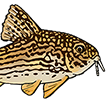Do fish dream?
- Dinyar
- Posts: 1286
- Joined: 31 Dec 2002, 00:34
- My articles: 3
- My images: 227
- My catfish: 10
- My cats species list: 3 (i:10, k:0)
- Spotted: 94
- Location 1: New York, NY, USA
- Interests: Mochokidae, Claroteidae, Bagridae, Malepteruridae, Chacidae, Heteropneustidae, Clariidae, Sisoridae, Loricariiadae
Do fish dream?
Mammals and birds experience REM sleep -- and apparently dream. I gather that most cold-blooded animals do not, and I presume that fish also do not. Does anyone have any further information on this?
Dinyar
Dinyar
From what I can find, fish do not undergo REM sleep, only behavioral rest/sleep. The best explanation I could find in journal articles on my university's library website was that ectotherms (fish, reptiles, amphibians, etc.) have different nerve structures in their brains and do not show evidence of REM activity like endotherms (mammals, etc). I'll let you know if I can find a more specific explanation.
Maybe fish only daydream instead....
Maybe fish only daydream instead....
- Silurus
- Posts: 12420
- Joined: 31 Dec 2002, 11:35
- I've donated: $12.00!
- My articles: 55
- My images: 893
- My catfish: 1
- My cats species list: 90 (i:0, k:0)
- Spotted: 424
- Location 1: Singapore
- Location 2: Moderator Emeritus
Some fish, particularly pelagic schooling species like tuna, don't appear to sleep (in the sense that we know).
Apparently, marine fish that sleep do so more soundly than freshwater fish, and it is hypothesized that the lability of the freshwater environment decreases the advantage of sleep (in the sense of resetting a biological clock).
Apparently, marine fish that sleep do so more soundly than freshwater fish, and it is hypothesized that the lability of the freshwater environment decreases the advantage of sleep (in the sense of resetting a biological clock).

- Dinyar
- Posts: 1286
- Joined: 31 Dec 2002, 00:34
- My articles: 3
- My images: 227
- My catfish: 10
- My cats species list: 3 (i:10, k:0)
- Spotted: 94
- Location 1: New York, NY, USA
- Interests: Mochokidae, Claroteidae, Bagridae, Malepteruridae, Chacidae, Heteropneustidae, Clariidae, Sisoridae, Loricariiadae
First, why should lability (changeability) decrease the advantage of sleep for FW fish? In endotherms, learning (an adaptation to environmental lability) is facilitated by sleep.Silurus wrote:[...] it is hypothesized that the lability of the freshwater environment decreases the advantage of sleep (in the sense of resetting a biological clock).
Second, what do you mean by "sleep (in the sense of resetting a biological clock)"?
Maybe we should get Achim in on this discussion. He's a circadian rhythm researcher, is he not?
Last edited by Dinyar on 27 Dec 2004, 03:20, edited 1 time in total.
- Silurus
- Posts: 12420
- Joined: 31 Dec 2002, 11:35
- I've donated: $12.00!
- My articles: 55
- My images: 893
- My catfish: 1
- My cats species list: 90 (i:0, k:0)
- Spotted: 424
- Location 1: Singapore
- Location 2: Moderator Emeritus
In the sense of obtaining food, vulnerability to predators, etc. according to the review in Reebs (2003):First, why should lability (changeability) decrease the advantage of sleep?
Reebs, SG, 2003. Plasticity of diel and circadian activity rhythms in fishes. Reviews in Fish Biology and Fisheries, 12 [2002]: 349-371.
This is not a field I am competent (or particularly interested) in, so I reserve further comment.

- sidguppy
- Posts: 3827
- Joined: 18 Jan 2004, 12:26
- My articles: 1
- My images: 28
- My aquaria list: 5 (i:0)
- Spotted: 9
- Location 1: Southern Netherlands near Belgium
- Location 2: Noord Brabant, Netherlands
- Interests: African catfishes and oddballs, Madagascar cichlids; stoner doom and heavy rock; old school choppers and riding them, fantasy novels, travelling and diving in the tropics and all things nature.
- Contact:
there are plenty freshwaterfishes that "sleep" as soundly as any Reef-inhabitant....
check out Discus or Angelfish for example. at night you can handpick them right out of the water!
the same goes for the Sandcichlids of Tanganyika.
most cichlidae (and AFAIK many Characins, Cyprinids and Cyprinodonts as well) are completely torpid at night.
so I don't think it's a freshwater versus marine issue, but something else.....
check out Discus or Angelfish for example. at night you can handpick them right out of the water!
the same goes for the Sandcichlids of Tanganyika.
most cichlidae (and AFAIK many Characins, Cyprinids and Cyprinodonts as well) are completely torpid at night.
so I don't think it's a freshwater versus marine issue, but something else.....
Valar Morghulis
- sidguppy
- Posts: 3827
- Joined: 18 Jan 2004, 12:26
- My articles: 1
- My images: 28
- My aquaria list: 5 (i:0)
- Spotted: 9
- Location 1: Southern Netherlands near Belgium
- Location 2: Noord Brabant, Netherlands
- Interests: African catfishes and oddballs, Madagascar cichlids; stoner doom and heavy rock; old school choppers and riding them, fantasy novels, travelling and diving in the tropics and all things nature.
- Contact:




